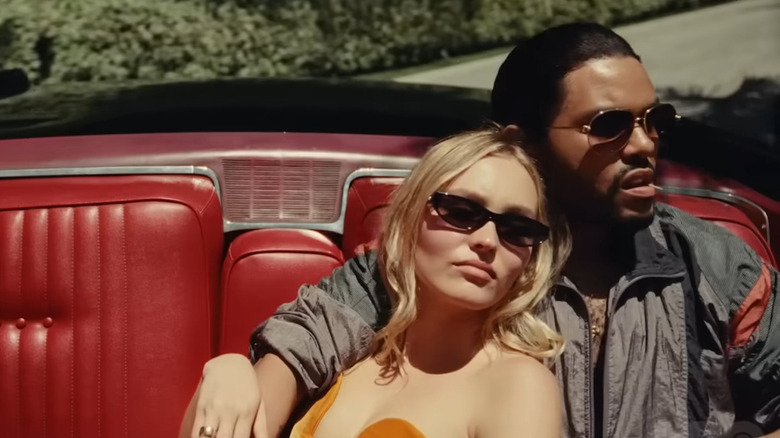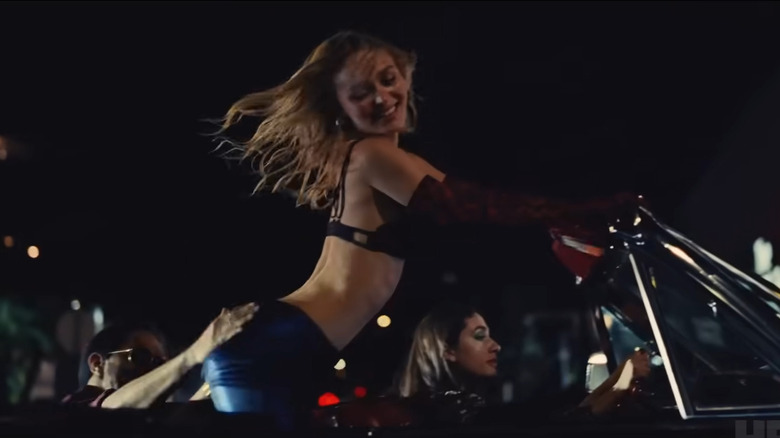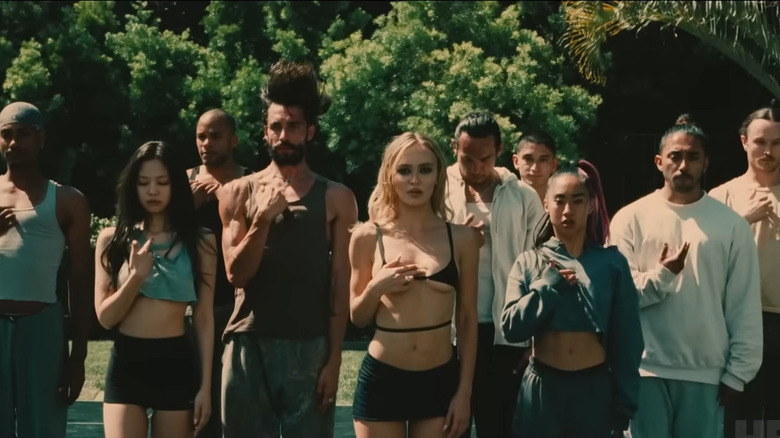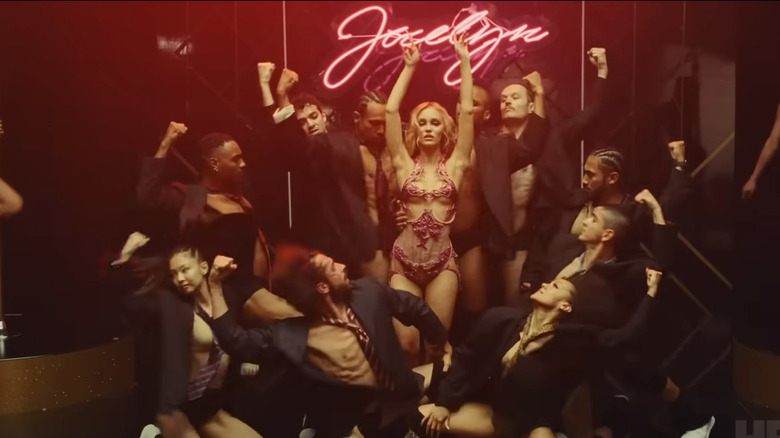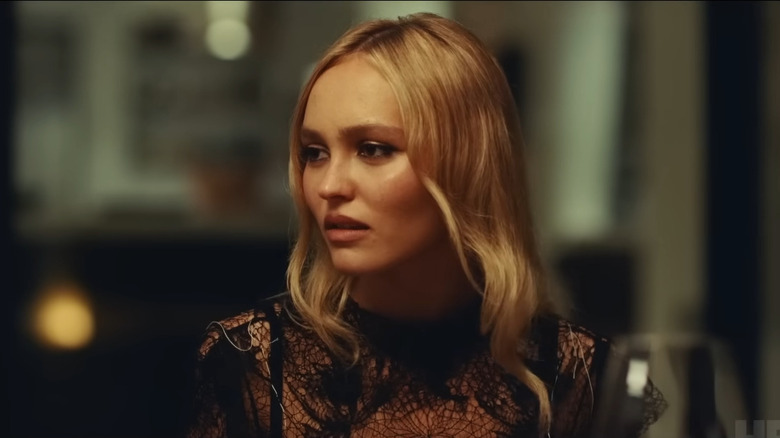The Idol Positions Oversexualization As Symbolism And The Sentiment Falls Grossly Flat
The new (HBO) Max show "The Idol" was already controversial months before its May 23 premiere at the 2023 Cannes Film Festival — but its creators aren't worried about the controversy. A 5-minute standing ovation followed its first two episodes (Cannes standing-Os seem much easier to come by these days). Created by Abel "The Weeknd" Tesfaye, Reza Fahim, and "Euphoria" showrunner Sam Levinson, it's finally streaming on June 4, after its November 2021 greenlight.
Talk of the show in early 2022 was enticing, especially to fans of HBO's "The Vow," as Lily-Rose Depp plays Jocelyn, a pop star intertwined with a nightclub owner (Tesfaye) who secretly leads a cult similar to NXIVM. But a March 2023 bombshell report from Rolling Stone described behind-the-scenes chaos that resulted in the departure of director Amy Seimetz, with Levinson scrapping an 80-percent finished season and reshooting the entire project. A source said it was "the most egregious" waste of money and resources they'd ever seen — especially considering the cost-cutting measures parent company Warner Bros. Discovery made after their merger.
Sources say Levinson removed much of the cult element and drastically increased the sexually explicit content — as he's apparently becoming known for. It's as if he heard the criticism about "Euphoria" being too sexually explicit for a show about teenagers and said, '"The Idol" is about grownups, so let's be as gross as we want.' But of course, where we might call it disgusting and exploitative, Levinson calls it "provocative" and "revolutionary." And he's not the first director to do this.
What happened to The Idol?
While HBO had initially encouraged Amy Seimetz to put her own spin on "The Idol" and were pleased with the episodes she finished, production returned from a scheduled hiatus with Seimetz out and Sam Levinson completely redoing the project. Reportedly, Abel Tesfaye didn't like how much the show leaned into the "female perspective" (though he denies the claims). "It was like the Weeknd wanted one show that was all about him — Sam was on board with that," a source told Rolling Stone.
The basic premise remains: Lily-Rose Depp's starlet Jocelyn experienced a psychotic break after her mother's death, and becomes ensnared by Tesfaye's Tedros, a wanna-be mogul who "helps" Jocelyn get back on top. After she sings her newest track about her sexual promiscuity, he essentially says he doesn't believe her, and she needs to "prove" her experience to him. Gross.
What started as a satiric commentary about celebrity culture and how fame chews up and spits out talent has apparently turned fetishistic and empty, relying more on over-sexualization and sexual violence than witty commentary. While pretending to be sex-positive and striking back against slut-shaming, early reactions suggest it instead comes off as salacious and misogynistic. Fortunately, most critics are panning it, resulting in a 27% Rotten Tomatoes score (thus far). Variety, in one of the kinder reviews, said it "plays like a sordid male fantasy." The Cut called it "a misogynistic, violent pornfest," and Daily Beast called it "Rape Culture: The Show." As a source told Rolling Stone, "It went from satire to the thing it was satirizing."
The Idol became more like Euphoria
It's clear from "The Idol" that Sam Levinson has the support of Warner Bros. Discovery executives, who refused to say no to him. Considering "Euphoria" is HBO's second-most watched series of all time after "Game of Thrones" (also hugely problematic), they're happy for Levinson to do whatever he wants. A source told Rolling Stone that HBO gave Levinson "essentially a blank check to turn it into 'Euphoria season 3 with pop stars' [which was] extremely, extremely frustrating."
Levinson doubled down on the already controversial sex in "Euphoria," dialing it way up for "The Idol," and apparently substituting character development for scintillating moments. Jocelyn quickly hooks up with Tedros after little introduction, then goes home and chokes herself while masturbating. Apparently, Jocelyn's psychotic break expresses itself through her penchant for asphyxiation, which Tedros takes advantage of. And yet, Rolling Stone reports even more appalling scenes that were fortunately never filmed, with Jocelyn begging Tedros to rape her, or Tedros beating Jocelyn up and her asking for more. When her friend says he's "kinda rapey," Jocelyn replies, "I like that about him."
Yet, we seem to know little about Jocelyn, other than she likes violent sex. We don't know much about how she became a star, her relationship to music, what she envisions for her career, or even her current standing. We don't even know why BDSM turns her on, other than as a ridiculous excuse for dealing with her mother's death. Instead, the series focuses more on her relationship with Tedros — who incidentally stays clothed the whole time.
What is Sam Levinson really saying?
While "The Idol" is clearly commenting on something, it seems to judge everything that bothers Sam Levinson about the entertainment industry post-#MeToo. It's as if the show is criticizing and complaining about recent advancements for women in entertainment, taking potshots at increased representation, protections like intimacy coordinators and nudity riders, and men having to be "careful" around women. The difference is, Levinson has Jocelyn voice these complaints. That way, it's not actually coming from Levinson, and it sounds sex-positive, as if women are the ones frustrated by these restrictions.
But the sexual exploitation shown in these scenes is violent — and only against the women in the show, without showing any sexual charisma on Tedros' part, other than explicit violence or graphic threats. It's clearly something found in a deprived, misogynistic male fantasy. After complaints about "Euphoria" having three different storylines about nude photos or videos taken without consent and leaked online, it's almost as if Levinson is giving himself permission to do this in "The Idol" by having Jocelyn insist that she wants to go fully nude, despite the intimacy coordinator trying to protect her. Levinson seems to be excusing, if not endorsing, any horrible behavior conducted by himself, or other men.
Yet Lily-Rose Depp raves about the conduct on set, making excuses for her lack of clothing. "I also think that the occasional bareness of the character physically mirrors the bareness that we get to see emotionally in her," Depp told Pop Crave. Sure... that would be sad if it weren't so laughable.
This male-gaze exploitation is nothing new
As frustrating as this is, it's certainly not new. There have been plenty of movies over the years that exploit and oversexualize women under the guise of deep, "artistic" filmmaking. Take "Cashback," for example, a 2006 film based on an Oscar-winning short where an artist can stop time and remove clothes from the customers (only the women, naturally) in the supermarket where he works, so he can draw them. It's put across as this "beautiful," lofty endeavor that celebrates the female form. But it's simply gratuitous nudity that is mostly unnecessary and serves no real purpose to the plot, from the male gaze of a self-indulgent filmmaker living out his fantasies.
And that's not the only film to do this (the Bechdel Test exists for good reasons). Consider other more well-known, critically acclaimed films like "She's Gotta Have It," "Ex-Machina," "Blade Runner 2049," "Nymphomaniac" (or anything by Lars von Trier), and even "The Danish Girl." Even Quentin Tarantino, often celebrated for his "strong women characters," walks a thin, complicated line between female empowerment and objectification and stereotypes.
It's easy to make excuses for older movies, long before the revelations of Harvey Weinstein and #MeToo, and the extremely slow but slightly progressing representation of women in Hollywood, before and behind the camera. But "The Idol" is happening now, and recent movies are guilty of this, such as the 2022 controversial Marilyn Monroe film, "Blonde." Have we learned nothing? Women need to be able to tell their stories — as Amy Seimetz had with "The Idol" before that opportunity was taken away.
The Idol isn't concerned about bad press, but we hope it won't work
Despite the controversy around "The Idol," its creators don't seem worried — in fact, they're relishing in it. As the saying goes, there's no such thing as bad publicity, and the controversy seems to be what "The Idol" is celebrating (and selling). What was once a satire about modern audience's thirst for reality-tv sensationalism and sexual exploitation is now simply providing that sensationalism and buzz. And it'll probably work. As Sam Levinson told the Cannes press conference in response to the Rolling Stone report, "I think we're about to have the biggest show of the summer."
It's also incredibly sad to consider Lily-Rose Depp is the star, the one simulating these exploitative situations in barely-there costumes even more revealing than the "band-aid" outfit in "The Fifth Element" (who knew that was possible). Cannes also celebrated her father Johnny, and his "comeback" after the pernicious results of his defamation lawsuit against Amber Heard. There's even a scene in "The Idol" where Jocelyn (accidentally?) cuts her thighs while masturbating with a glass, which is horrifyingly reminiscent of one of Heard's accusations from the trial. Lily-Rose is also goddaughter to Johnny's BFF Marilyn Manson, who himself is facing sexual assault allegations from Evan Rachel Wood. In fact, it's near impossible not to be reminded of the horror Wood experienced, as she detailed in her documentary "Phoenix Rising," when then-boyfriend Manson raped her on camera for his "Heart Shaped Glasses" video. It's not "provocative" or "revolutionary," and it's definitely not art. It's horrific, and it shouldn't be condoned.
